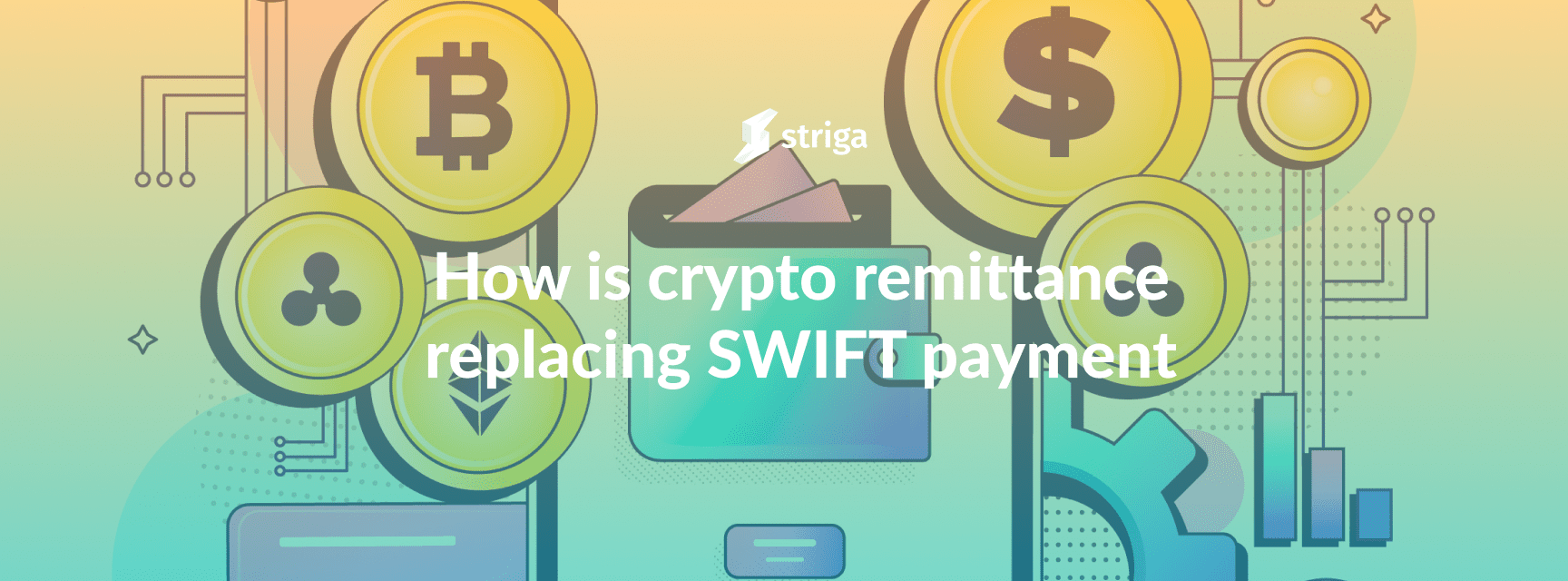
SWIFT alternatives: How is crypto remittance replacing SWIFT payment?
SWIFT alternatives: How is crypto remittance replacing SWIFT payment?
- Striga
- 6 min read
Table of Contents
Blockchain in banking and crypto remittance has become a significant threat to cross-border funds transfer systems due to its distributed ledger and ability to enable transactions with minimal fees. Among these systems, SWIFT, a consortium of banks that manages a large portion of global transactions, is most at risk from the disruptive potential of blockchain technology.
Challenges with SWIFT payment for remittance in emerging markets
International transfers or remittances are often viewed from the perspective of people living in developed countries sending financial aid to their friends and families in developing countries.
However, users from emerging countries are at a disadvantage due to the financial system’s severe challenges when it comes to international money transfers. These challenges start with the significant exchange fee markup of approximately 10%, which places an additional financial burden on the sender.

Hight exchange fees
In addition to high exchange fees, users from emerging countries face high transfer fees and an extended settlement time of up to five days. This delay can cause severe difficulties for recipients who may need the funds urgently, as well as significant frustration for senders who expect prompt and efficient service.
SWIFT & Crypto
These issues highlight the need for a better remittance solution in emerging markets. While traditional systems such as SWIFT payments have been the norm, they have proven to be inadequate in meeting the needs of users in emerging markets. A new, innovative solution is required to provide faster, more cost-effective, and more efficient remittance services to users in these regions. Such a solution would not only help alleviate the financial burden on senders but also provide essential support to recipients in need.
What are the disadvantages of SWIFT payment?
Despite being the industry standard for international payments, SWIFT has some notable disadvantages. One of the most significant issues with SWIFT is the time it takes to process payments. Typically, a transfer goes through several banks within the SWIFT network, and the process is rather complex. As a result, it can take several days for a payment to be completed, which can be frustrating for users who expect faster, more efficient services.
The significant financial burden for SWIFT transaction
In addition to the lengthy processing time, SWIFT transfers are sometimes expensive. Intermediary banks may add their fees to the cost of the transfer, making the overall cost of using the SWIFT network higher than expected. This can cause a significant financial burden on users who need to make international payments frequently, especially those from emerging markets where remittance fees are already high.
Lack of transparency and security
Furthermore, SWIFT has faced criticism for its lack of transparency and security. In the past, there have been instances of fraud and cyberattacks that have compromised the SWIFT network’s integrity. These issues have highlighted the need for a more secure and transparent payment system that can provide users with greater peace of mind and confidence when making international payments.
Overall, while SWIFT has been the go-to payment system for international transfers, its disadvantages cannot be ignored. The need for a more efficient, cost-effective, and secure payment system has become increasingly important, particularly in emerging markets where users are often at a disadvantage due to high fees and lengthy processing times.
Crypto remittance: Sending money with crypto

Sending money abroad using cryptocurrencies has become increasingly popular due to its cost-effectiveness and efficiency. There are several startups and service providers that can help facilitate cryptocurrency remittances, even without requiring users to understand much about the blockchain technology being used.
Crypto cross-border payments
Users can use crypto wallets, neobanks, or crypto-friendly fintechs to deposit EUR using their vIBANs and convert the EUR into any cryptocurrencies. In Europe, a lot of companies can build the whole flow of funds on top of a crypto-banking as a service platform, making the process seamless and user-friendly.
Once the user finalizes the conversion, they can send the cryptocurrencies using on-chain transactions to anyone in the world, and the recipient will receive the funds instantly. This process is much faster than traditional methods like SWIFT, which can take several days to complete.
Crypto remittance is replacing SWIFT payments
Additionally, using cryptocurrencies to send money abroad is much cheaper than SWIFT, with a range of cross-border remittance fees between 0.25% – 2%, depending on the service provider used. This can result in significant cost savings for users who need to make frequent international payments.
In conclusion, sending money abroad using cryptocurrencies has become a viable alternative to traditional methods like SWIFT. With its cost-effectiveness, efficiency, and ease of use, it offers a compelling option for users who want to send money internationally quickly and securely while avoiding the high fees associated with traditional methods.
SWIFT alternatives: Sending Money Abroad with Crypto
In conclusion, the use of cryptocurrencies for remittance is becoming a viable alternative to traditional methods like SWIFT. It offers a cost-effective, efficient, and user-friendly option for sending money internationally, particularly for users in emerging markets who face high fees and lengthy processing times with traditional systems. While SWIFT has been the go-to payment system for international transfers, its disadvantages cannot be ignored. The need for a more efficient, cost-effective, and secure payment system has become increasingly important, and cryptocurrencies are providing a solution that meets these needs.
Striga Crypto-native Banking as a Service:
Your path to building and launching financial products
Join the financial businesses that use Striga’s cloud platform to delight their customers and launch their own products without the complexities that come when dealing with core banking solutions’ relationships, licensing, compliance and payments methods.
